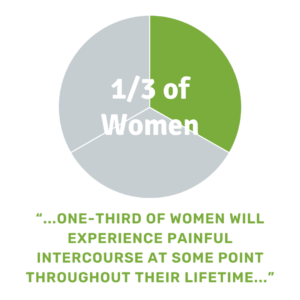Is it normal for sex to be painful? Short answer: no, sex should not be painful! However, one-third of women will experience painful intercourse at some point throughout their lifetime, and often many of them will not speak to their friends, partners, or medical providers about it due to stigma or embarrassment. Everyone deserves to live active, enjoyable lives free from pain, and your sex life is no exception. Sex should be about pleasure and connection, not worry or discomfort.
Why do I have pain during sex?
There are a variety of reasons why sex may hurt or be uncomfortable. Pain with sex looks and feels different for everyone. Pain may be due to an acute or chronic condition limiting the desire for intimacy, or may be only experienced during sexual intercourse. For some individuals, the pain is rare; for others, it occurs every time they attempt intercourse. Even though this may be a common issue, it is not normal and you do not have to accept it as a part of your life forever.
Causes
There are many possible causes of a painful sexual experience. Understanding the diverse causes of painful sex allows for a comprehensive approach to diagnosis and treatment, involving both physical and psychological considerations. Here are some of the most common issues that can contribute to pain during sex:
-
Hormone Changes:
Hormone changes play a crucial role in sexual health, and fluctuations can lead to painful intercourse. One common cause is vaginal dryness, particularly prevalent in peri or post-menopausal and post-partum women due to a decline in estrogen levels. This decline can result in insufficient lubrication, causing discomfort and pain during sex.
-
Pelvic Pain Conditions:
Various pelvic pain conditions contribute to painful sexual experiences. Pelvic floor dysfunction is a key factor, either as a primary cause or in response to other pain conditions. When pelvic floor muscles are excessively tight, penetrative intercourse becomes challenging or impossible. Conversely, weakness in other muscle groups, such as abdominal, lower back, or hip muscles, can lead to compensatory tightening of the pelvic floor muscles, affecting core stability and causing pain during intercourse.
-
Pelvic Organ Prolapse:
Pelvic organ prolapse is another potential cause of painful sex. This occurs when pelvic organs, such as the bladder, uterus, or rectum, descend into the vaginal space. The displacement of these organs can result in discomfort and pain during intercourse.
-
Stress and Other Psychological Factors:
Stress is a multifaceted contributor to painful sex. Psychological factors, including stress, trauma, or abuse, can manifest physically during sexual activity. Emotional distress may increase muscle tension, impacting the pelvic floor and exacerbating pain. Addressing stress and its psychological impact is crucial in managing and alleviating sexual discomfort.
Other conditions contributing to pain include interstitial cystitis (also known as painful bladder syndrome), scar tissue restriction following abdominal surgery, and infection.
Please note that this is not an exhaustive list. There are many reasons why you may be experiencing painful intercourse, and a medical professional can help you determine the cause(s) and treatment options.
What can I do to treat it?
Pelvic floor physical therapy is a non-invasive (non-surgical) treatment option. Because each person and each pain presentation is different, treatment requires an individualized approach. Physical therapy will first involve a thorough assessment to determine the root cause of dysfunction. Treatment will likely involve strategies to promote relaxation including breathing, muscle release through manual treatment and stretches, and targeted exercise.
However, painful intercourse is often layered and may require a multi-provider approach. For example, you may be recommended to follow up with a physician or gynecologist if there are signs of hormonal deficiency or infection, or with a mental health provider to address existing psychological factors.
It is important to note that Kegels (pelvic floor contractions) are not the answer to all pelvic floor dysfunction and will not necessarily reduce your pain. If your pain is due to muscle tension, or repetitive contractions, Kegels can make the pain even worse. Your provider will help you determine if Kegels are an appropriate exercise option for your specific conditions.
Is there anything I can do to help it right now?
Absolutely! Here are some tips on how you can reduce discomfort during sex:
- Practice deep belly breathing for pelvic floor muscle relaxation
- Use a quality lubricant to reduce vaginal dryness and friction which can be irritating to vaginal tissues
- Some of our favorite brands include: UberLube, Slippery Stuff, Good Clean Love, and Chiavaye
- Discontinue Kegels until further assessment by a pelvic floor physical therapist
- Try out different positions during intercourse or add pillows for additional support so you can fully relax
- Communicate with your partner or partners about what you are experiencing
- Share your experience with your medical provider so they can assist with initiating referrals to begin treatment
Remember, pain during sex is NOT normal. There are many different resources to help you treat your specific issues, and pelvic floor physical therapy could be the first step of your healing journey.
If you have any questions about painful or uncomfortable sex, or if you’re curious to see if you are a good candidate for pelvic floor therapy, give us a call or send us a message. We would love to talk with you!




